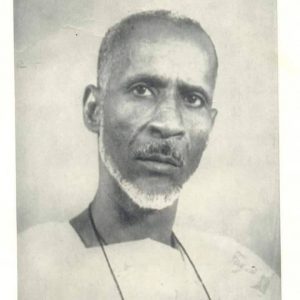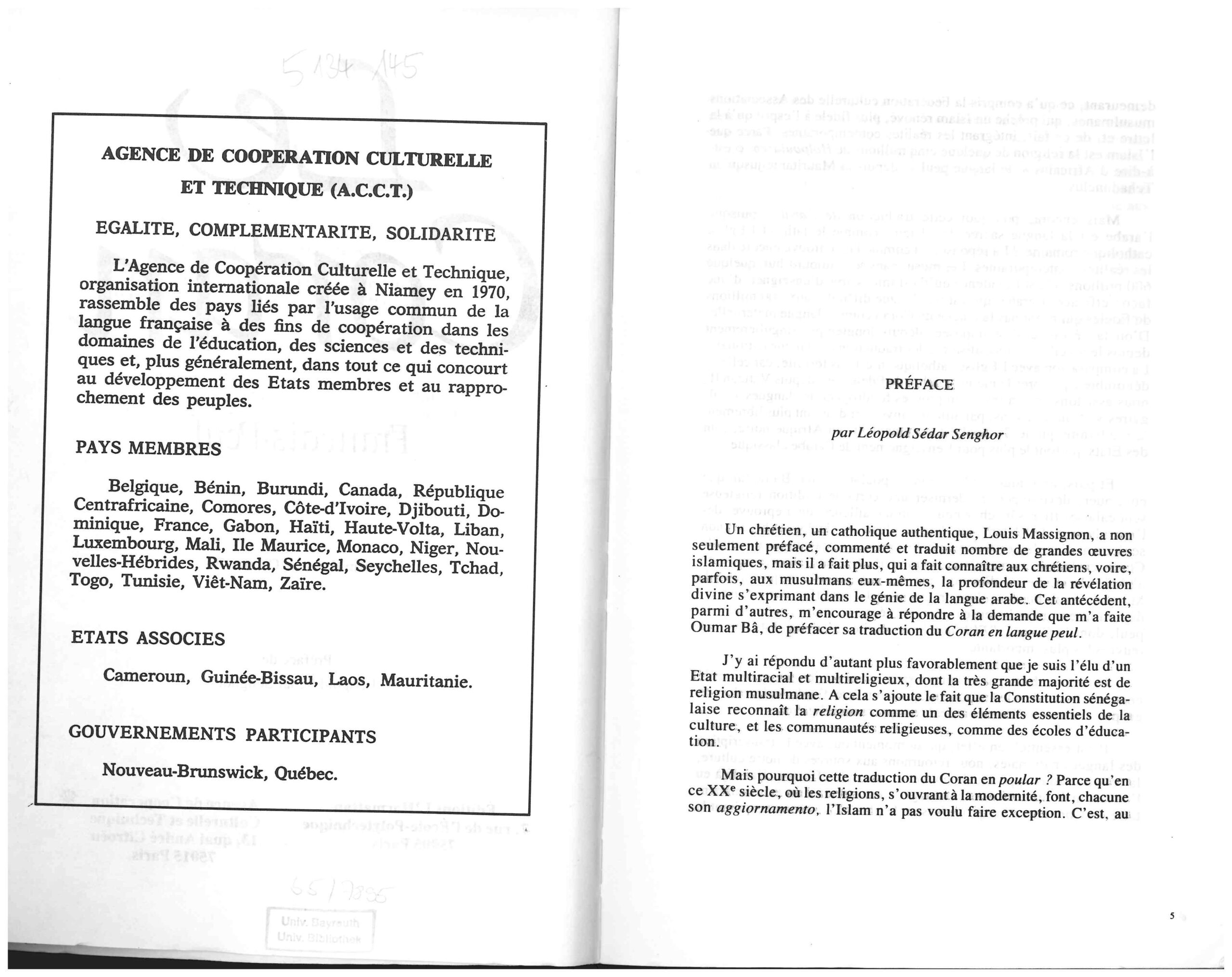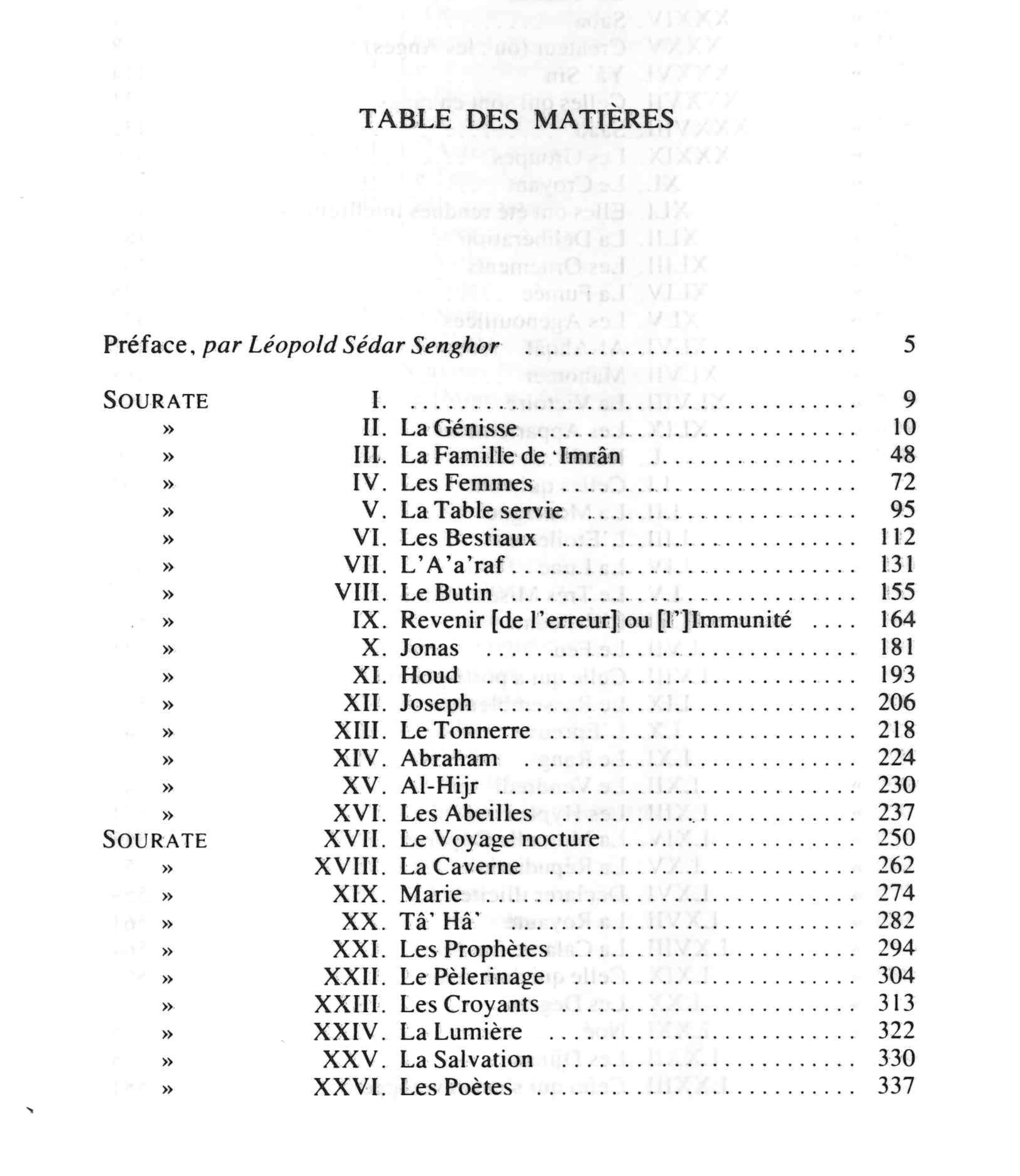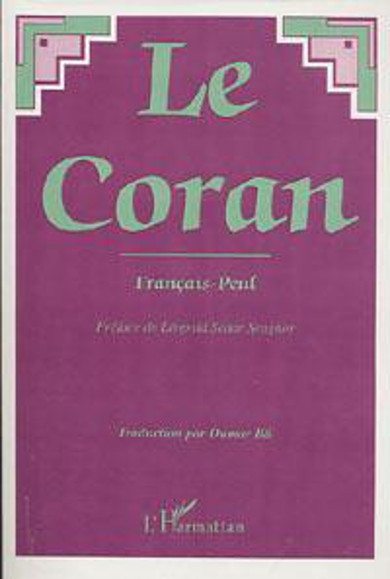In a period in which, one after another, the countries of francophone Africa gained independence, the renowned West African intellectual Oumar Bâ (1917–1998) embarked upon writing the very first Qur’an translation into the Fula (or Fulani, or ‘Peul’ in French) language. Or at least, it was the first translation that was put down in writing, printed in Latin script and conformed to a modern European idea of ‘translation.’ Oumar Bâ’s work was finally published as a bilingual French–Fula version with the title Le Coran: Français–Peul. The work was an attempt to promote the local cultural and linguistic heritage published with financial support from France and penned by an author whose acclaim rested mostly on the Francophone literature he had produced. In addition to Bâ’s translation, it contains a preface by Léopold Sédar Senghor, a Catholic Christian who was the first president of Senegal. For many reasons, Oumar Bâ’s Qur’an translation is a fascinating document of the contradictions and ambivalences of the early postcolonial period in West Africa.


Fula is a Senegambian language that is spoken today by around 25 million people – nearly all of them Muslims – across approximately eighteen countries in West and Central Africa, in all of which it is a minority language. This is emblematic of the consequences of the colonial and postcolonial compartmentalization of Africa. The same is true of the biography of Oumar Bâ, who was a member of the Fula people and whose career and networks traversed the borders of modern nation-states.

Oumar Bâ was born in the Futa Toro region, which is situated on the middle run of the Senegal river. Futo Toro and the territories north of it were only conquered by the French and added to their colonies as late as around 1900. Oumar’s father was a qadi and Oumar initially received a traditional Islamic education, which included memorizing the Qur’an. When he was around nine years old, his village chief decided that he should enter the colonial school system, despite the reluctance of his father, who would have preferred him to become an Islamic scholar. A few years later, Oumar Bâ’s academic achievements were such that he was sent to a school in Port-Louis, the former capital of the colony. Originally founded in the nineteenth century as a ‘hostage school’ where the sons of village chiefs had been forcibly ‘civilized,’ by the 1930s its purpose was the education of the sons of local notables in order to incorporate them into the colonial administration. Oumar Bâ, accordingly, went on to serve the administration in various functions for several decades: as a teacher, a school inspector, working for the postal and telegraph service, and as a columnist for the newspaper PARIS – DAKAR. All of these appointments took place within the territorial boundaries of what is today Senegal, which at the time was one of the eight administrative units of French West Africa. Things changed in 1952 when, after taking an exam to become an interpreter, Oumar Bâ was sent to work in the regions that lay north of the Senegal river and were therefore part of a different administrative unit, that of Mauritania. But his time in Mauritania was to be short, and only two years later, he returned to Dakar to assume a position in the colonial government. Soon afterwards, he was granted leave to obtain a diploma in Lomé (today in Togo), and went on to study at the Institute of Higher Overseas Studies, a school for indigenous peoples from the French colonies in Paris. After his graduation, he enrolled at Institute of Political Science in Paris. During all this time, his identity seems to have been that of a native of the Futa Toro country who was at the same time a colonial subject of the federation of French West Africa.

But, as the winds of change were felt in West Africa and decolonization loomed on the horizon, Oumar Bâ suddenly found himself a citizen of Mauritania and was called back to serve ‘his home country.’ This was because the French had chosen to define the Senegal river as the border between the administrative regions of Senegal and Mauritania, and Oumar Bâ happened to have been born a few hundred meters north of it. When France, in a last-ditch effort to prevent the loss of its colonies, converted them into semi-independent protectorates in 1958, Oumar Bâ’s Futo Toro identity became all but irrelevant. Being now classed as a Mauritanian, he was appointed as a prefect in Tidjikja, several hundred kilometers to the north of his place of birth. After the independence of Mauritania was achieved in 1960, he was appointed simultaneously as the first director of both the civil service and the national radio broadcasting, after which he became a permanent delegate of Mauritania to UNESCO and a counselor at the Mauritanian embassy in Paris, a series of ‘double appointments’ which reflected the lack of educated staff in the country at the time.
Oumar Bâ’s life took another unexpected turn in 1965, when he was appointed head of IFAN Mauritania. IFAN had been founded in 1938 in Dakar as the French Institute of Black Africa (‘Institut français d’Afrique noire’), and charged with the mission to research the languages and cultures of the peoples of the region. In subsequent decades, branches were established in all parts of the then colony. In 1966, it was renamed the ‘Fundamental Institute of Black Africa’ (‘Institut fondamental d’Afrique noire’). In the same year, Oumar Bâ was director of the Mauritanian committee for the preparation of the first World Festival of Black Arts. During this festival, which took place in Dakar, he made the acquaintance of leading African writers and intellectuals, including Léopold Sédar Senghor who was both a poet and president of Senegal at the time. Senghor appointed Bâ as Director of Research at IFAN Dakar, and this gave him the time and resources to publish extensively in a wide range of genres, from poetry to academic studies, and on an equally wide range of topics, from language to botany. He also acquired a doctorate from the Sorbonne with a thesis on the Fulani of Futa Toro. His desire to rediscover the region’s heritage included an increased engagement with Islam, and it was probably during his time in Dakar that he started working on his Fula Qur’an translation, since the foreword written by Senghor – who had a Fula mother – is dated to 1970. However, the translation was only published after Oumar Bâ permanently moved to Mauritania in 1976. There he held a variety of positions related to research, language policy and translation, travelled extensively, built academic networks and received numerous honors from institutions on all continents. He also studied Arabic in Saudi Arabia for several years, when he was already well past retirement age, receiving his diploma in 1990. He passed away in Nouakchott in 1998, and in one obituary was described as embodying fulanité, africaineté and francophonie in equal measure: indeed, this seems to be quite an apt epitaph of a man who had led such an eventful life.
Le Coran: Français–Peul was published in 1982, and reprinted in 2001, by Éditions L’Harmattan in Paris, a publisher specializing in non-fiction books on Sub-Saharan Africa, in collaboration with A.C.T.T. (Agence de Coopération Culturelle et Technique), an international organization founded by francophone countries in 1970 and modelled after the Commonwealth of Nations (but mainly funded by France and Canada). Typeset by typewriter, the book contains a French and a Fula translation of the entire Qur’an in adjacent columns, verse for verse in the canonical order, without any annotation or commentary. The book does not include the Arabic text of the Qur’an.


The French translation contained in the book is in actual fact the work of the French Orientalist Régis Blachère, first published between 1949 and 1950, complemented with elements from the 1929 translation by the French-Swiss Orientalist Édouard Montet. Surprisingly, neither of these translators is acknowledged in the book. For some reason, the rendition of the first sura is taken from Montet’s translation while the rest of the suras are based on Blachère’s text, occasionally with an interpretation by Montet added in brackets. This results in some divergences, for example with regard to the translation of al-raḥmān al-raḥīm, and Oumar Bâ made no attempt to harmonize between them.
When it comes to the Fula translation, this was Oumar’s own work. He used the Pulaar variety of Fula spoken in Futo Toro and wrote the text in Latin script, as opposed to Arabic script, which was traditionally used in the region for Islamic literature. He tried, to a certain extent, to align the French with the Fula translation; for example, in both languages he included a remark at every occurrence of disjointed letters at the beginning of suras stating that only God knows the secret of their meaning. However, the Fula translation seems to have been based directly on the Arabic: it is not identical to the French one and is generally shorter because Oumar Bâ omits most of Blachère’s explanatory additions. He uses comparatively few Arabic expressions, with the exception of words such as ‘Alla’ that are part of the Fula vocabulary. When compared to two more recent Fula Qur’an translations, that by the King Fahd Glorious Qur’an Printing Complex in Medina (2003 partial, 2012 complete) and that by the Rowad Translation Center in collaboration with the Saudi missionary institution Islamhouse (2022), it is clear that both the King Fahd Complex and Islamhouse translations opt for Arabic terminology far more often than Oumar Bâ, especially when a term is contested. The translation by the King Fahd Complex, in particular, also includes significantly more explanatory expansions than that that of Oumar Bâ.

This can be seen, for example, in their translations of Q 103:1 wa l-ʿaṣr, typically translated into English as ‘by the late afternoon’ or ‘by the time/by the passage of time’:
| Bâ (French) | Bâ (Fula) | King Fahd Complex | Rowad Center |
| Par le Destin ! (après midi) | Mi woondiri takkusaan! [‘By the late afternoon!’] | Alla wii mi hunoroke alaasara. | E waqtu asri. |

Oumar Bâ faithfully uses Blachère’s idiosyncratic French translation but he is obviously not entirely happy with it because he adds Montet’s far more conventional après midi (‘afternoon’) to Blachère’s destin (‘destiny’). What is more, his Fula translation exclusively reflects Montet’s interpretation. Unlike the two Saudi translations, he does not use the Arabic term ʿasr in his translation, nor does he see any need for the addition made by the King Fahd Complex which specifies that this is God’s speech.
It seems that whenever Blachère’s rendition clashes with common Muslim interpretations of a given term, there is also a clash between the French and Fula versions of Oumar Bâ’s translation. For example, the contested term al-sāʾiḥūn (Q 9:112) is tentatively rendered by Blachère as ‘those who glorify (?) the lord’ (‘qui glorifient [?] le seigneur’) which, once again, is an unusual translation. Oumar Bâ faithfully copies Blachère’s wording in his French translation, but in Fula he uses the term hoorooɓe – ‘those who fast.’ This is a traditional ḥadīth-based mainstream interpretation that we also find in the more recent Saudi translations. Incidentally, Montet also translates the term as denoting ‘to fast,’ but in this case Oumar Bâ does not include his interpretation in the French translation. We find a similar conflict in Q 7:157 where Muḥammad is called ‘the ummī Prophet’ (al-nabī al-ummī) which Blachère and Oumar Bâ render into French as ‘the Prophet of the Gentiles’ (‘le Prophète des Gentils’) whereas Oumar Bâ’s Fula translation uses the term humambinne (‘ignorant’), similar to Montet (‘illettré’) and identical to the later Saudi translations.
Le Coran: Français–Peul is emblematic of an ambivalent postcolonial period in which many newly established West African countries strove for the revival (or invention) of national traditions while at the same time attributing great prestige to French cultural models, as well as the French language. This is visible in Senghor’s foreword to Oumar Bâ’s Qur’an translation, in which he starts by justifying the very fact that he, a Catholic, agreed to write a preface to a Muslim text; and the main precedent he cites in this regard is the French Catholic Orientalist Louis Massignon. For Senghor, this translation is an indicator that Islam, like other religions, is ‘opening to modernity.’ And besides, he argues,
by translating the Qur’an into Fula, Oumar Bâ is only continuing, developing and modernizing a specifically Senegalese religious tradition. Here, as elsewhere, people have felt since the introduction of Islam, which dates back several centuries, the need to not only explain the Qur’an and comment on it but also to translate it into vernacular languages. Oumar Bâ has done no more than transcribe into the Latin – that is to say, modern – script something that had previously been oral.

This foreword, like the translation itself, evokes a centuries-old tradition and at the same time emphasizes its outdatedness by framing only the written, and only the Latin script, as modern. It would not be until the 2000s that the King Fahd Complex would try to reconnect the modern genre of Qur’an translation to precolonial traditions by presenting a version of its partial Fula translation in Arabic script, in addition to its Latin translation. In 1970, when Senghor wrote his foreword, or in 1982, when Oumar Bâ’s translation was published, the time was not yet ripe for taking this step. The rediscovery of the Fula and the Futa Toro heritage took place in a setting in which ‘francophone’ equated with ‘modern.’
Johanna Pink
